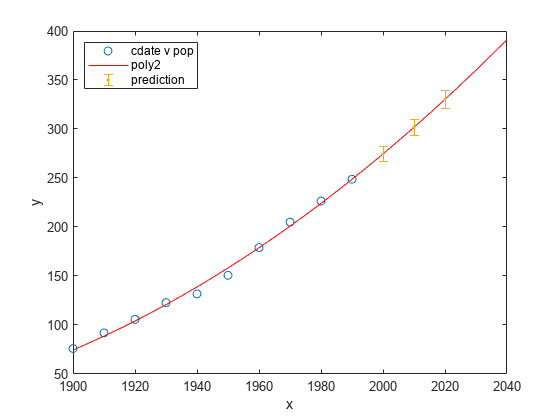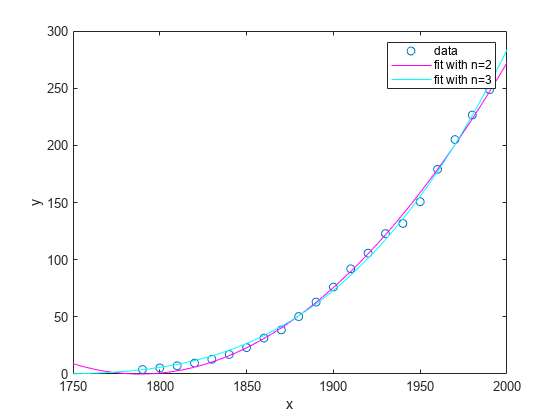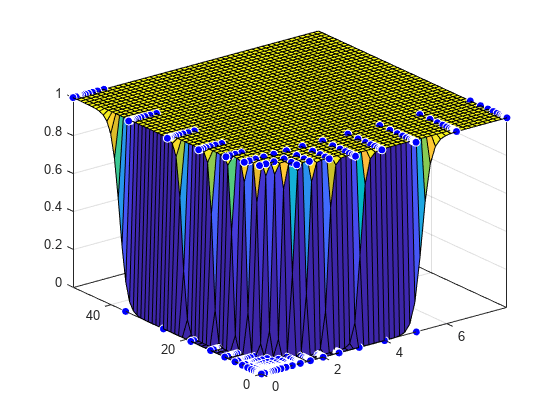Linear and Nonlinear Regression
Regression is a method of estimating the relationship between a response (output) variable and one or more predictor (input) variables. You can use linear and nonlinear regression to predict, forecast, and estimate values between observed data points. Curve Fitting Toolbox™ functions allow you to perform regression by fitting a curve or surface to data using the library of linear and nonlinear models, or custom equations.
Use the Curve Fitter app to fit curves
and surfaces to data interactively. For more information, see Curve Fitting. You can also use the fit function to fit a
curve or surface to a set of data at the command line. For a simple example,
see Polynomial Curve Fitting.
Apps
| Curve Fitter | Fit curves and surfaces to data |
Functions
Topics
Tutorials
- Parametric Fitting
Find all library model types for the Curve Fitter app and thefitfunction, set fit options, and optimize starting points. - Introduction to Least-Squares Fitting
Perform least-squares fitting by using error distributions and linear, weighted, robust, and nonlinear least squares. - Polynomial Models
Fit polynomials in the Curve Fitter app or with thefitfunction. - Exponential Models
Fit exponential models in the Curve Fitter app or with thefitfunction. - Fit Fourier Models
Fit Fourier series models in the Curve Fitter app or with thefitfunction. - Gaussian Models
Fit Gaussian models in the Curve Fitter app or with thefitfunction. - Power Series
Fit power series models in the Curve Fitter app or with thefitfunction. - Rational Polynomials
Fit rational polynomial models in the Curve Fitter app or with thefitfunction. - Sum of Sines Models
Fit sum of sines models in the Curve Fitter app or with thefitfunction. - Weibull Distributions
Fit Weibull distribution models in the Curve Fitter app or with thefitfunction. - Custom Models
If the Curve Fitting Toolbox library does not contain a desired parametric equation, you can create your own custom equation. - Custom Linear Fitting
In the Curve Fitter app, you can use the Custom Equation fit to define your own linear or nonlinear equations.
Tools Workflow
- Interactive Curve and Surface Fitting
Select data and model types to fit curves and surfaces by using the Curve Fitter app and then save your session. - Data Selection
Select data to fit curves and surfaces in Curve Fitter app, identify compatible size data and troubleshoot data problems. - Compare Fits in Curve Fitter App
Find the best fit by comparing visual and numeric results, including fitted coefficients and goodness-of-fit statistics. - Surface Fitting to Franke Data
Create and compare surface fits in Curve Fitter app using example data. - Surface Fitting to Biopharmaceutical Data
Curve Fitting Toolbox software provides some example data for an anesthesia drug interaction study. - Custom Nonlinear ENSO Data Analysis
This example fits the ENSO data using several custom nonlinear equations. - Gaussian Fitting with an Exponential Background
This example fits two poorly resolved Gaussian peaks on a decaying exponential background using a general (nonlinear) custom model.
Programmatic Workflow
- Curve and Surface Fitting
Workflow for programmatic curve and surface fitting in Curve Fitting Toolbox. - List of Library Models for Curve and Surface Fitting
Find all Curve Fitting Toolbox library model names for programmatic data fitting with thefitfunction. - Curve and Surface Fitting Objects and Object Functions
Learn how to create, access, and modify curve and surface fit objects. - Polynomial Curve Fitting
This example shows how to fit polynomials up to sixth degree to some census data using Curve Fitting Toolbox. - Fit Polynomial Model to Data
This example shows how to fit a polynomial model to data using the linear least-squares method. - Compare Robust Fitting Methods
This example shows how to fit a polynomial model to data using the bisquare weights, least absolute residuals (LAR), and linear least-squares methods. - Custom Nonlinear Census Fitting
This example shows how to fit a custom equation to census data, specifying bounds, coefficients, and a problem-dependent parameter. - Fit Exponential Model to Data
This example shows how to fit an exponential model to data using the trust-region and Levenberg-Marquardt nonlinear least-squares algorithms. - Improve Model Fit with Weights
This example shows how to fit a polynomial model to data using both the linear least-squares method and the weighted least-squares method for comparison. - Surface Fitting with Custom Equations to Biopharmaceutical Data
This example shows how to use Curve Fitting Toolbox™ to fit response surfaces to some anesthesia data to analyze drug interaction effects.



